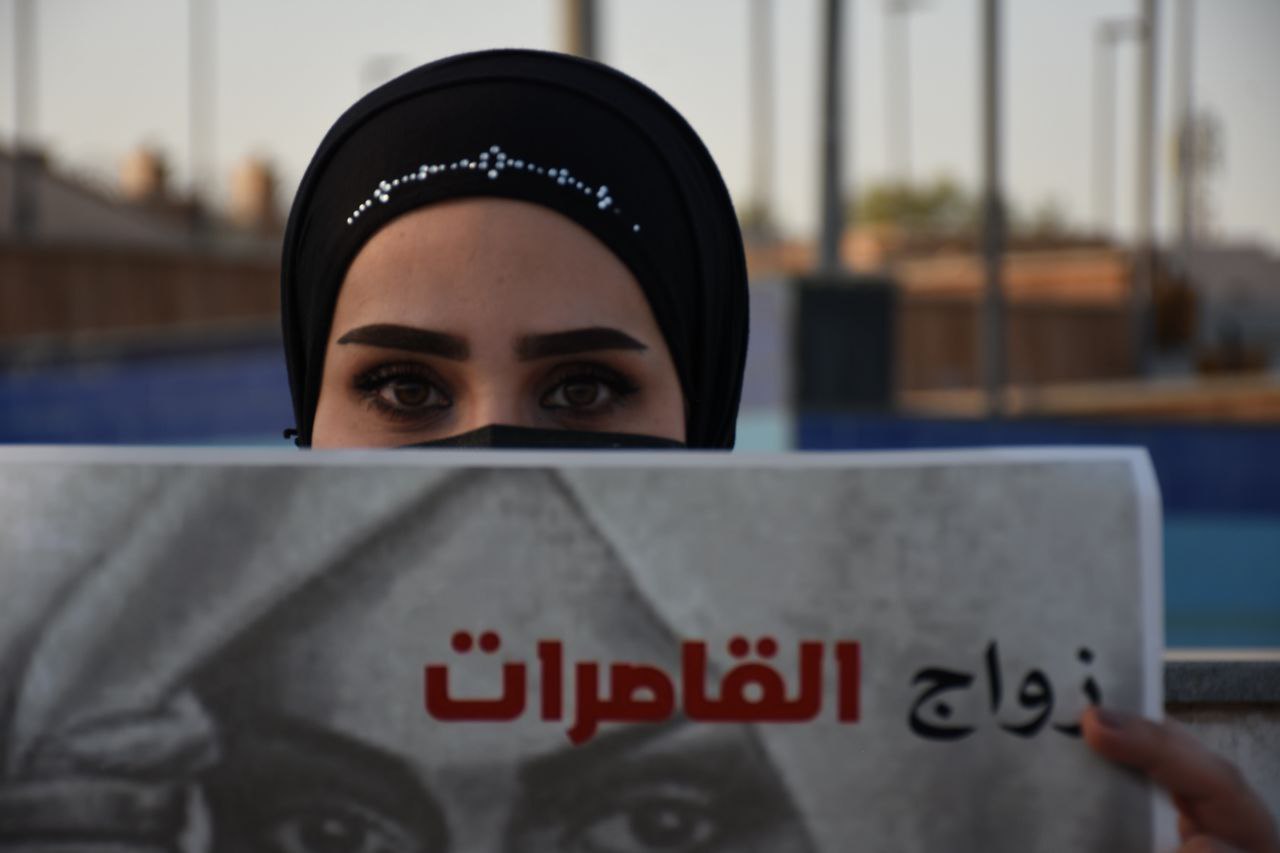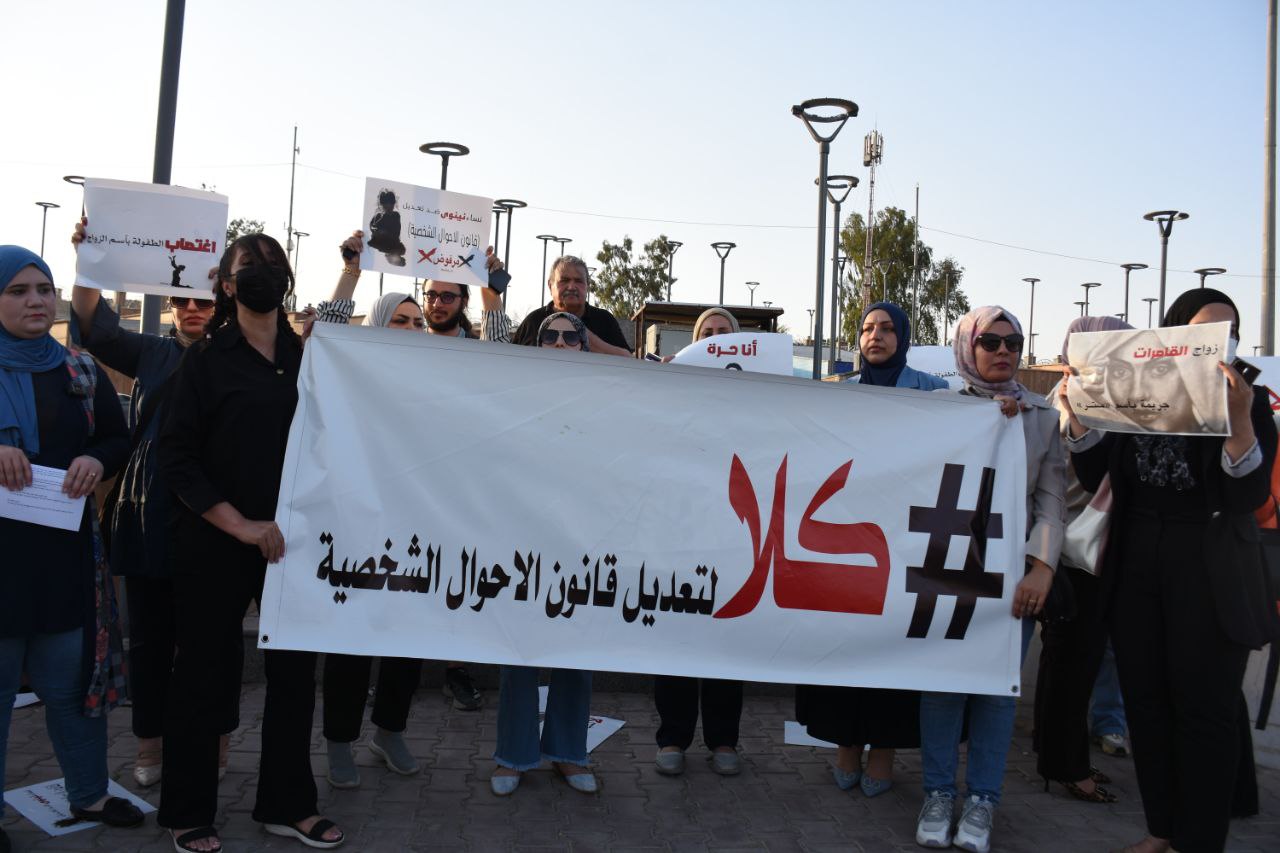Dr. Youssef Abdullah, Imam and preacher of the Haji Sunni Mosque in Erbil, calls for preventing the application of the Sharia Code of Personal Status according to the Jaafari Shia sect, as he considers it a threat to the rights of women, children, forced marriage of girls, and the civil state.
Youssef Abdullah, who holds a doctorate in comparative jurisprudence from the Faculty of Sharia and Law at Al-Zaim Al-Azhari University in Sudan, sheds light on the Jaafari Code, which was approved at the end of last August based on the new amendment to the Personal Status Law in Iraq.
The new amendment and the adoption of the Code were met with a wave of protests, particularly among women's rights activists.
Dr. Youssef says that one of the greatest dangers posed by the code is the possibility of marrying girls after they reach puberty, when "a girl reaches puberty at the age of nine according to the Ja'fari school of thought."
He pointed out that "fathers are the guardians of girls, and a girl must submit to her father even if she hates marriage." This comes while the four Sunni schools of thought set the marriage age at 18, which is the age adopted by the Personal Status Law.
Dr. Youssef explained that "women do not enjoy any rights under Ja'fari jurisprudence... Men can practice temporary marriage (Muta), but this type of marriage is forbidden by Sunnis."
"Marriage according to the Ja'fari code is invalid and impermissible... As clerics, we reject this because it contradicts religion and the constitution."
KirkukNow: The adoption of a code of Sharia rulings on personal status matters according to the Ja'fari Shia school of thought has raised questions among many people who are not familiar with this field. I would like to ask: How does Ja'fari jurisprudence differ from the four Sunni schools of thought on matters of marriage?
Youssef Abdullah: Differences between jurisprudence Ja'fari jurisprudence and other Islamic schools of thought are a profound topic that requires careful study and much ink is spilled. In my opinion, this should not be called Ja'fari jurisprudence, but rather Imami Shi'ism, which differs significantly from other Islamic schools of thought. This is evidenced by the Imamis themselves, who believe in the Quran, Sunnah, reason, and consensus. However, according to Shi'a, they believe in the Twelve Infallible Imams. This is where they differ from Sunnis. However, Sunni schools of thought consider the Quran to be the source of legislation, followed by the Sunnah, then analogy, followed by the consensus of scholars.
Another difference is that they believe in the Imams, meaning that anyone who does not believe in the Twelve Imams is considered outside the fold of Islam. The Twelve Imams begin with Imam Ali ibn Abi Talib (may God be pleased with him) and end with the awaited Imam Mahdi, whom Shi'a believe has not yet appeared. However, among Sunnis, there is a caliphate after the Prophet Muhammad (peace and blessings be upon him). Muslims choose a leader, but he is not considered infallible. Regarding matters of jurisprudence and marriage, some Shi'a believe that temporary marriage is permissible.
If we look at the matter, we see that this type of marriage is harmful to women and children. First, in Ja'fari jurisprudence, the age of puberty for girls is nine years old and for boys is 15 years old. This means that Ja'fari scholars allow girls to marry at the age of nine, and they do not have guardianship, as guardianship is in the hands of their fathers. They must obey their fathers' orders, even if they dislike marriage. However, the four Sunni schools of thought set the age of marriage at 18, which is the age relied on in personal status law. Furthermore, the girl must consent to the marriage, and the father cannot force her into marriage. Girls can also be married at the age of 15, provided they are pubescent and of sound mind.
In Sunni jurisprudence, two witnesses are required during the marriage contract, but this is not required in Shi'a and Ja'fari jurisprudence. Therefore, women generally do not enjoy any rights in Ja'fari jurisprudence. However, if we look at personal status law, a large portion of which is based on the doctrines of the Shi'a, we see that women enjoy many rights.
KirkukNow: What about children after divorce? Or regarding the issue of inheritance in the event of the husband's death?
Youssef Abdullah: Regarding children after divorce, the children are placed with the father and the mother loses custody rights. This deprives the mother of her children. Furthermore, the wife does not receive any share of her deceased husband's property, such as land and houses, except for cash.
Another point of Ja'fari jurisprudence is that women are only allowed to seek divorce in three cases: if the husband travels, if he fails to provide for her, if he does not have intercourse with her at home, or if she is subjected to violence. However, among Sunnis, a wife can seek divorce in all cases.
Therefore, I believe that the majority of legislators do not support the implementation of the Ja'fari Code and agree that it greatly harms women.
KirkukNow: If the Ja'fari Code is implemented, are there risks for Sunnis? What are they?
Youssef Abdullah: Implementing the so-called Ja'fari Code poses a great danger to all Sunnis in Iraq, including Kurds, because they want to impose Shiite doctrine.
Scholars agree that the implementation of the Ja'fari Code poses a threat to the Iraqi civil state and the Iraqi constitution, and leads to the control of the Shiite Imami authority over the judiciary in a civil state, also considered a violation of human rights and women's rights, as the code permits the marriage of girls as young as nine and legitimizes temporary marriage.

KirkukNow: If a Sunni man marries according to the Jaafari Code, is his marriage considered valid and established in terms of faith and belief?
Youssef Abdullah: Without a doubt, any marriage according to the Jaafari Code is invalid and null.
KirkukNow: You, as clerics, are Sunnis, if this code is implemented, will you abide by it, or will you call for the implementation of Sunni jurisprudence for followers of other Sunni sects?
Youssef Abdullah: We certainly will not abide by it because it contradicts the views of Sunni sects.
KirkukNow: Why do you believe the code violates the constitution, given that Article 41 of the constitution stipulates that "each sect has the right to have its own law for personal status," and that the code has become part of the law?
Youssef Abdullah: The Jaafari code violates the Iraqi constitution and the jurisprudence of the four sects. If you examine the law, you will see that sectarianism prevails over all the laws and regulations of the state and the four sects. Now they have made the Jaafari code law for a state that has had law for decades. The Jaafari code, according to Article 14 of the constitution, violates the principle of equality and discriminates against Iraqi citizens on the basis of sect. It also contradicts all international human rights agreements signed by Iraq and incites divisions among Iraqis.
KirkukNow: What do you say to the regional government? Do you support or reject the implementation of the code in the Kurdistan Region of Iraq KRI?
Yousef Abdullah: We undoubtedly ask the Kurdistan Regional Government KRG not to allow the implementation of the provisions of the Ja'fari Code in the Kurdistan Region in any form, because it contradicts the religion, laws, and constitution of Kurdish Muslims. It also contradicts everything related to Sunni Muslims, women, men, and children.
KirkukNow: If an Arab resident of the Kurdistan Region requests a marriage contract according to the Ja'fari Code, do you consider this normal, or do you think this will become a way to implement it in Kurdistan as well?
Yousef Abdullah: The Kurdistan Region can refuse to allow this, based on the provisions of the Iraqi constitution. Therefore, each community (Kurds, Sunnis, Shiites) can contract marriages according to their own laws, just as Shiites have long followed the Ja'fari Code in marriage matters.
KirkukNow: Can you explain more about how Kurds, Shiites, and Sunnis can marry under the constitution?
Youssef Abdullah: The Personal Status Law placed matters of marriage, divorce, inheritance, and child custody within a civil framework. Islamic jurisprudence encompasses all of these matters, particularly Hanafi jurisprudence, which applied to all Iraqis.
However, the Ja'fari jurisprudence has been in effect since 2014 and continues to apply to all Iraqis. It allows Shiites to marry according to Ja'fari jurisprudence, but Kurds and Sunni Arabs are bound by the Personal Status Law and enter into marriages according to this law, based on Article 41 of the Iraqi Constitution, which stipulates that Iraqis are free to adhere to personal status law according to their religions and sects.
However, there was no law for each component and sect, so the Personal Status Law became a reference, and there were no problems with it. However, the Shiites established the Ja'fari Code and can implement it or not, while the Kurds and Sunnis will continue to adhere to the Personal Status Law.
KirkukNow: You mentioned that the Shiites have been using the Ja'fari Code for a long time, but the Code was only approved ten days ago. What do you mean?
Youssef Abdullah: I mean that Shiites are committed to those they call the infallible imams, and they implement any fatwa issued by them, whether it is included in the constitution or not.
For Shiites, the constitution and the law have no value in comparison to the fatwas of their imams. In Lebanon, for example, the personal status law was drafted on a sectarian basis, with each community having its own court according to its beliefs, religion, and sect.
In Iraq, the Ja'fari Code was effectively implemented before the constitution was issued, but later, matters were unified with Law No. 188 of 1959. After 2003, they attempted to issue the Ja'fari Code, but they were unsuccessful.
Meanwhile, it is being neglected outside the courts, in violation of the constitution. For example, there is no legal text permitting temporary marriage, but it has been practiced for years in Najaf, Karbala, Kadhimiya, and areas where Shiites have influence. Even the marriage of girls as young as nine is considered illegal.






